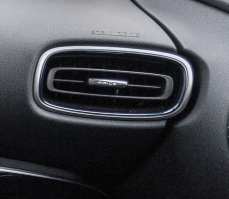
— A Toyota Prius air conditioner smell lawsuit has been dismissed after a Prius owner claimed bad odors emanated from the AC vents.
The Toyota Prius class action lawsuit alleges the heating, ventilation and air conditioning systems have defects that cause the bad smells.
The Toyota Prius class action lawsuit includes these vehicles:
- 2006-2020 Toyota Prius
- 2017-2020 Toyota Prius Prime
- 2010-2015 Toyota PHV
- 2012-2016 Toyota Prius C
- 2012-2017 Prius V
Plaintiff James Bettles purchased a new Toyota Prius in December 2016, but months later he noticed a bad smell coming from the air conditioner vents.
The plaintiff at first believed the odor was from his shoes or socks, but the smell got worse even after washing the socks and buying new shoes.
The plaintiff took his Prius to a dealer about six months after purchasing the car and “advised the service representative of the foul odor that had been emanating from the A/C vents, as well as his attempts to figure out its cause.”
Toyota technicians said there was nothing wrong with the Prius and there were no problems with the air conditioning.
However, the class action lawsuit alleges the smell got even worse and "would intensify when he switched from A/C mode to regular fan mode” and was "immediately noticeable upon a cold start."
The Toyota Prius smell from the vents caused the plaintiff to take the car back to the dealer in December 2017 to complain about the “continued and worsening odors.”
According to the lawsuit, the plaintiff told the Toyota dealer there was a defect causing the bad smell from the air conditioning. A dealer supervisor allegedly said there have been “thousands of similar complaints about smells from these kinds of cars.”
The Prius class action asserts Toyota knew the heating and cooling systems were defective and he should have been told before he purchased the car.
Toyota Prius Class Action Lawsuit Dismissed
The plaintiff filed the lawsuit for more than $5 million in September 2021 which caused Toyota to file a motion to dismiss. The plaintiff dropped two of his claims voluntarily and the judge ruled the remaining claims were time-barred.
However, the judge allowed the plaintiff to amend and refile his Prius class action lawsuit.
The Toyota lawsuit alleges the statute of limitations should be suspended because Toyota concealed the alleged air conditioning defects that caused the bad smells. Toyota again filed a motion to dismiss arguing the claims must be dismissed because they are time-barred.
Toyota and the plaintiff both agree each of Bettles's claims is subject to a four-year statute of limitations which expired in December 2020.
"Because Bettles's claims are subject to a four-year statute of limitations and he filed the Complaint on September 22, 2021, (Compl.), he must show that the statute of limitations was tolled until at least September 2017. To employ the discovery rule, the plaintiff 'must specifically plead facts to show (1) the time and manner of discovery and (2) the inability to have made earlier discovery despite reasonable diligence.'" — Judge Otis D. Wright, II
The judge points to the plaintiff referencing numerous complaints made to the government and elsewhere online about bad smells coming from Toyota Prius vents. This shows the information was available to the plaintiff more than four years before he filed the class action lawsuit.
"Together, Bettles's allegations establish that he 'ha[d], or should have [had], inquiry notice of the cause of action' prior to September 2017."
The judge also found Bettles failed to allege that he diligently investigated the defect.
“In other words, plaintiffs are required to conduct a reasonable investigation after becoming aware of an injury, and are charged with knowledge of the information that would have been revealed by such an investigation.” — Judge Wright
The plaintiff alleges the bad smell emanating from the air conditioning vents “became increasingly more-foul” even after the Toyota dealership advised that “there was nothing wrong with the . . . HVAC system” in approximately May 2017."
However, the judge says Bettles fails to allege he investigated the alleged defect beyond returning to the dealership a second time.
The plaintiff also allegedly failed to provide factual allegations to show Toyota concealed an alleged defect that caused the bad AC smell.
The judge ruled the Toyota Prius bad AC smell class action lawsuit is again dismissed, but allowing the plaintiff to amend his lawsuit would be useless. This time Toyota's motion to dismiss the lawsuit was granted "without leave to amend and with prejudice."
The Toyota Prius bad smell lawsuit was filed in the U.S. District Court for the Central District of California: James Bettles, v. Toyota Motor Corporation, et al.
The plaintiff is represented by Edelsberg Law, P.A., Kopelowitz Ostrow Ferguson Weiselberg Gilbert, and Gordon & Partners, P.A.




